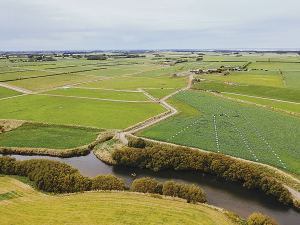MPI launches industry-wide project to manage feral deer
An industry-wide project led by Ministry for Primary Industries (MPI) is underway to deal with the rising number of feral pests, in particular, browsing pests such as deer and pigs.
 DairyNZ is seeing a significant increase in the number of farmers improving their wintering practices.
DairyNZ is seeing a significant increase in the number of farmers improving their wintering practices.
Every time people from overseas see photographs of cows up to their hocks in mud it's bad for New Zealand.
That's the view of respected animal welfare experts and veterinarian Dr John Hellstrom. He's the former chief veterinarian of Ministry for Primary Industries, the former chair of the National Animal Welfare Advisory Committee and now leading the movement to stop the export of live animals overseas.
His comments come in the light of yet another critical article on the practise of winter grazing in Southland in the weekly magazine in the NZ Listener which led with the headline - 'stuck in the mud'.
Hellstrom says there is a place for winter grazing in Southland, but only if it is properly managed, and he sees a lot of farmers are doing it properly, but a lot who aren't.
"There is a huge societal concern about the way cows are managed when it comes to winter grazing, and photographs showing examples of bad practices are going to affect our markets in the long term," he told Rural News.
Hellstrom says for too long nothing has happened in terms of properly regulating the practice and some farmers continue to bury their heads in the mud by not wanting to face up to the problem. He sas there are some who have successfully convinced the Government to back off the regulations that were supposed to be managed.
He says the problems occur mainly when the winter crops are put in the wrong place or when farmers don't do due diligence to see whether it is appropriate for their farm. He says there are reports out there that show farmers have not been given good advice about where best to plant these fodder beet crops.
"As a result, they end up with animals in the wrong conditions at the wrong time. There are plantings going on flood plains that are simply not appropriate.
"They should be on rolling land either side of the plain," he says.
Hellstrom says people are deluded if they think cows want to be up to their hocks in mud all the time. He says the fact that the cows survive and cope and we don't get too many fatalities is irrelevant. Hellstrom says that is quite aside from the number of calves that are born into those conditions, which he says there is no excuse for given the information farmers have on winter grazing.
"I just shake my head when anybody says it's okay for cows to be wandering around in those conditions. Amazingly, I have heard farmers say it's disloyal for people to draw attention to this kind of stuff. That is nonsense because those poor conditions should not exist in the first place," he says.
Hellstrom says it's asking an awful lot to expect the industry to sort out the problem and given some of the things that are happening, there is a need for regulations.
Mating wrapped up last month at the across-breed Beef Progeny Test on Pāmu’s Kepler Farm in Manapouri.
Libby Judson is a keeper of memories from an age gone by. Tim Fulton tells her story.
A New Zealand-first native tree study has highlighted the Bioeconomy Science Institute's position as a forestry research leader.
Hemp fibre processor Rubisco is relocating its core processing facility to Ashburton as part of a $20-$30 million expansion to leverage what it says is an accelerating global demand for sustainable and renewable fibres.
Tradition meets some of the latest in technology at the 2026 East Coast Farming Expo.
OPINION: Trade Minister Todd McClay and the trade negotiator in government have presented Kiwis with an amazing gift for 2026 - a long awaited and critical free trade deal with India.